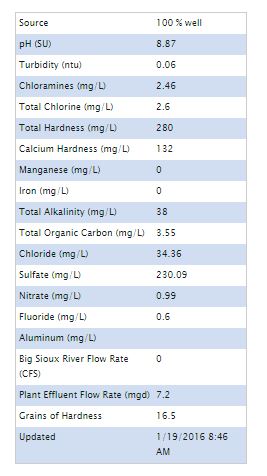mweg
New Member
Posted this in the all-grain section, but someone suggested this might be a better place.
I have done about a half dozen all grain brews so far, and they have all turned out excellent. However, the more I read on here, the more I worry about water profile and how it might be affecting my beers.
I am currently using city tap water with no additions (many brewers I have talked to here say they successfully use straight city water for everything). I understand that most people here recommend getting a water report from Ward labs or the like, but my city posts a water quality report nearly every day on their website. I feel like this would be far more useful than a sample I take once a year or so, but the problem is I am unsure if the city report contains all the information I need to fill out something like the Bru'n Water spreadsheet or even the EZ Water Calculator.
Here is a link to the water report: https://www.siouxfalls.org/public-works/water-division/water-quality
Would someone be able to help me translate that into some useful info for one of the spreadsheets? Or is it a lost cause? I will also attach a screenshot of today's report so we can keep referencing the same numbers. Thanks in advance for any assistance!

I have done about a half dozen all grain brews so far, and they have all turned out excellent. However, the more I read on here, the more I worry about water profile and how it might be affecting my beers.
I am currently using city tap water with no additions (many brewers I have talked to here say they successfully use straight city water for everything). I understand that most people here recommend getting a water report from Ward labs or the like, but my city posts a water quality report nearly every day on their website. I feel like this would be far more useful than a sample I take once a year or so, but the problem is I am unsure if the city report contains all the information I need to fill out something like the Bru'n Water spreadsheet or even the EZ Water Calculator.
Here is a link to the water report: https://www.siouxfalls.org/public-works/water-division/water-quality
Would someone be able to help me translate that into some useful info for one of the spreadsheets? Or is it a lost cause? I will also attach a screenshot of today's report so we can keep referencing the same numbers. Thanks in advance for any assistance!



